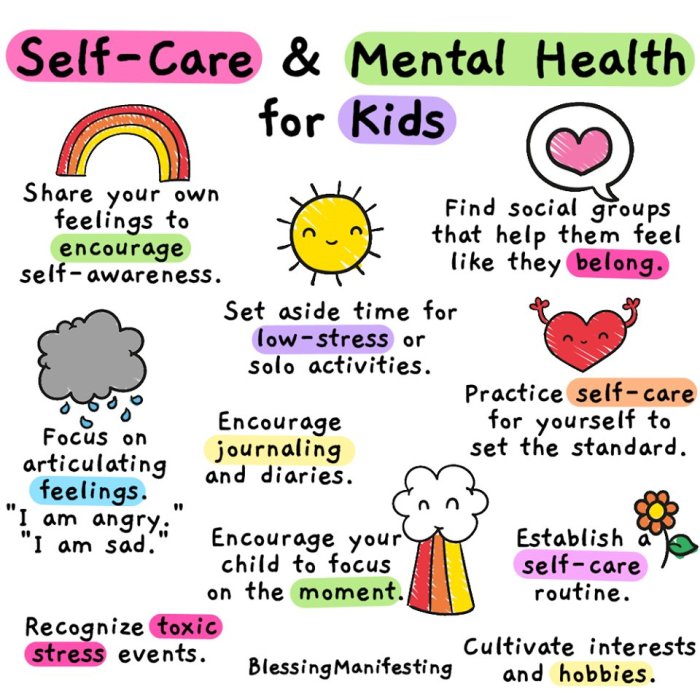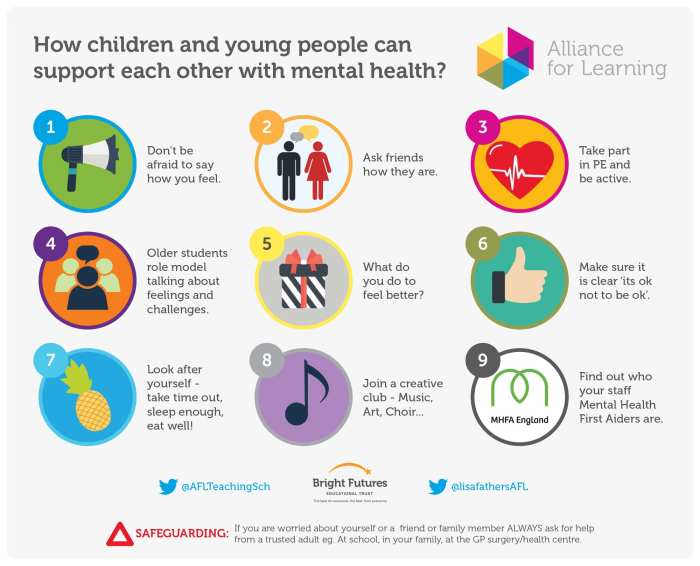
Exploring the vital aspects of enhancing children’s mental health and well-being, this guide delves into practical tips and strategies to support young minds in their growth and development.
From understanding the significance of mental health to exploring effective ways to create a nurturing environment, this narrative aims to provide insightful guidance for parents, caregivers, and anyone involved in a child’s life.
Importance of Children’s Mental Health
Maintaining good mental health is crucial for children’s overall well-being as it directly impacts their emotional, social, and cognitive development.
Positive Impacts of Good Mental Health
- Improved academic performance: Children with good mental health are better able to focus, learn, and retain information in school.
- Healthy relationships: Good mental health helps children build strong connections with family, friends, and peers.
- Resilience: Children with good mental health are better equipped to cope with stress, challenges, and setbacks.
Role of Parents and Caregivers
- Provide a nurturing environment: Parents and caregivers play a crucial role in creating a safe and supportive environment for children to express their feelings and emotions.
- Encourage open communication: Regular communication and active listening help children feel understood and valued, promoting positive mental health.
- Teach coping skills: Parents can teach children how to manage stress, regulate emotions, and problem-solve effectively.
Factors Affecting Children’s Mental Health
When it comes to children’s mental health, various factors can play a significant role in either supporting or hindering their well-being. Understanding these factors is crucial in ensuring that children grow up in a healthy and nurturing environment.
Common Factors Negatively Impacting Children’s Mental Health
- Exposure to violence or abuse
- Family conflicts or instability
- Peer pressure and bullying
- Untreated mental health disorders
- Chronic stress or traumatic events
Influence of Social Interactions on a Child’s Mental Well-being
Social interactions can significantly impact a child’s mental health. Positive relationships with family, friends, and peers can provide emotional support, build self-esteem, and foster a sense of belonging. On the other hand, negative interactions, such as bullying or social isolation, can lead to feelings of loneliness, anxiety, and depression.
How the Environment Affects a Child’s Mental Health
The environment in which a child grows up, whether at home or school, can have a profound impact on their mental well-being. A supportive and nurturing environment with caring adults, safe surroundings, and access to resources can promote positive mental health outcomes.
Conversely, an environment characterized by neglect, violence, or lack of emotional support can contribute to mental health issues in children.
Tips for Improving Children’s Mental Health

When it comes to enhancing children’s mental health, there are various strategies and techniques that can be implemented to foster resilience, create a supportive environment, and help children manage stress and anxiety effectively.
Fostering Resilience in Children
Resilience is the ability to bounce back from challenges and adversity. To help children develop resilience, it is essential to encourage them to problem-solve, learn from failures, and build a positive self-image. By praising their efforts rather than just their achievements, children can develop a growth mindset that enables them to persevere through difficulties.
Additionally, providing opportunities for children to engage in activities that promote self-confidence and independence can help them build resilience.
Creating a Supportive and Nurturing Environment
A supportive and nurturing environment plays a crucial role in children’s mental health. Parents, caregivers, teachers, and other adults in a child’s life should focus on building strong, positive relationships with them. Open communication, active listening, and emotional support are key components of creating a supportive environment.
By fostering a sense of belonging and safety, children are more likely to develop healthy coping mechanisms and have a strong support system in place.
Helping Children Manage Stress and Anxiety Effectively
Stress and anxiety are common experiences for children, but it is important to help them learn how to manage these emotions effectively. Teaching children relaxation techniques such as deep breathing, mindfulness, or visualization can be beneficial in reducing stress levels.
Encouraging physical activity, healthy eating habits, and adequate sleep also play a significant role in managing stress and anxiety. Additionally, providing children with outlets for self-expression, such as art, music, or journaling, can help them process their emotions in a healthy way.
Promoting Child Health
Regular check-ups and vaccinations play a crucial role in ensuring the well-being of children. By keeping up with scheduled visits to healthcare providers, parents can monitor their child’s growth and development, as well as detect any health issues early on.
Significance of a Balanced Diet and Physical Activity
Maintaining a balanced diet and incorporating regular physical activity are essential for promoting child health. A diet rich in fruits, vegetables, whole grains, and lean proteins provides the necessary nutrients for growth and development. Encouraging children to engage in physical activities not only improves their physical health but also contributes to their mental well-being.
Role of Preventive Measures
Preventive measures such as proper hand hygiene, adequate sleep, and creating a safe environment are key in safeguarding children from illnesses. Teaching children healthy habits from a young age can significantly reduce the risk of infections and diseases. Additionally, promoting a positive and supportive environment at home and in school can contribute to overall health and well-being.
Conclusive Thoughts

As we conclude our discussion on tips for improving children’s mental health and well-being, remember that fostering resilience, promoting a healthy lifestyle, and prioritizing preventive measures are key elements in ensuring the overall well-being of our younger generation.
Questions Often Asked
How can I help my child build resilience?
To foster resilience in children, encourage problem-solving skills, teach them to manage emotions effectively, and provide opportunities for them to learn from setbacks.
What role do social interactions play in a child’s mental well-being?
Positive social interactions can boost a child’s self-esteem, reduce feelings of loneliness, and enhance their emotional well-being.
How can I create a supportive environment for my child’s mental health?
Creating a supportive environment involves active listening, open communication, setting boundaries, and fostering a sense of security and trust within the family.





